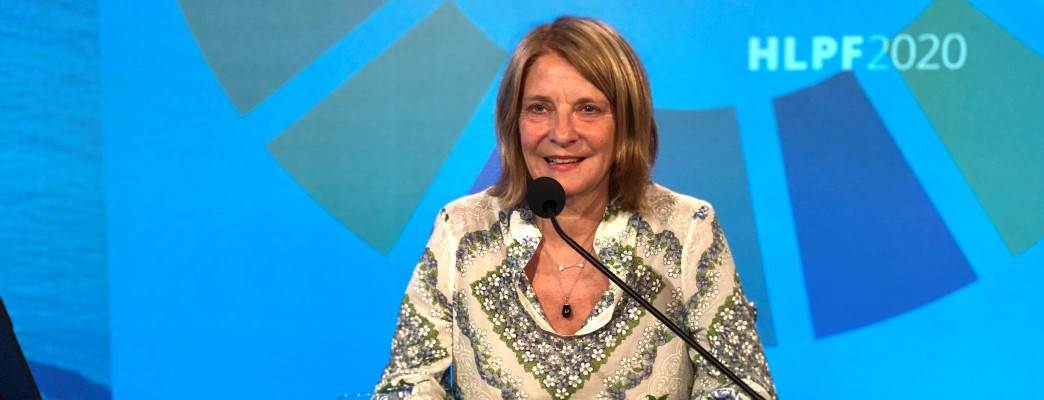Deputy Secretary-General, Excellencies, Colleagues,
COVID-19 is changing the world we live in.
But, it should not change our commitment to realising the future we want.
During HLPF, we heard again and again a strong commitment to the Sustainable Development Goals.
From Member States, civil society, experts and youth representatives, the message was loud and clear: The 2030 Agenda remains our shared roadmap to achieve the future we want. And, to recover better.
As a civil society representative from Zimbabwe so eloquently put it: “The 2030 Agenda is an agenda of the people, by the people, for the people.”

Dear colleagues,
To recover better we need policies that build on the synergies encompassed in the SDGs.
This is why, over the past two weeks, we have looked at six areas for accelerated progress:
First, advancing human wellbeing.
For example, we highlighted that increasing girls’ access to schooling will also reduce infant and maternal mortality rates.
Second, integrated food systems.
Where our discussions showed that fundamental changes are needed to make our food systems an engine for inclusive growth, agriculture sustainability, and achieving zero hunger.
Third, protecting the planet.
We cannot recover better without addressing climate change and the alarming rate of biodiversity loss, land and forest degradation.
The scientific community and indigenous peoples reminded us about the importance of nature-based solutions.
They are key to increased resilience.
Fourth, sustainable energy.
We heard that ensuring access to affordable, reliable, sustainable, and modern energy for all can open up a new world of opportunities and empowerment for billions of people.
Fifth, urban development.
We recognised the important role of local governments in transforming global intentions into community action.
Sixth, inclusive growth.
We acknowledged that we cannot revert to the old normal.
Indeed, one of our resource persons from the Committee on Development Policy implored us to do everything we can not to go back to normal, because normal was part of the problem.
All of our discussions have underlined that the recovery from COVID-19 represents a rare opportunity to shape a new normal.

We also heard the voices from countries in special situations.
African countries, least developed countries, landlocked developing countries, and small island developing states will bear the brunt of the pandemic and its repercussions.
We heard from Malawi about the staggering social costs of school closures. A stark reminder that urgent action is needed to prevent the reversal of hard-won development gains.
We also heard from 47 countries that presented their voluntary national reviews.
They brought us a message of hope and encouragement, that we must stay the course in accelerating progress towards the SDGs.
Dear colleagues,
The HLPF Ministerial Declaration is an opportunity to demonstrate the United Nations’ global solidarity during this ongoing crisis, and our commitment to recover better.
I would like to express my sincere gratitude for the excellent work and dedication of its co-facilitators: Ambassador Panayotov of Bulgaria and Ambassador Mudallali of Lebanon.
While a few important issues need further discussion, the main elemens for an ambitious declaration are already emerging from the consultations.
The virtual consultations – and the discussions in the Forum – have shown the commitment of all delegations to the Agenda 2030 and the Sustainable Development Goals.
We also want to strongly reaffirm our commitment to multilateralism and international solidarity in the context of the COVID-19 crisis.
I think we are close to an agreement on a declaration that will be visionary, well balanced, action-oriented, and focused on the key challenges of our times.
I encourage all member states to support a consensus-based adoption of the Declaration very soon – its core messages are certainly more important than ever.
Dear friends,
We are in the midst of global upheaval and risk – from COVID-19, to the climate crisis, from racial injustice to rising inequalities.
“Why don’t we just change?” our youth asked us at the opening of HLPF. “We’ve already changed in ways no one ever thought we could”, they reminded us, and said: “We are ready. We’ll do it.”
Indeed, let us follow their lead.
Let us change for the better, and recover better.
Thank you.
